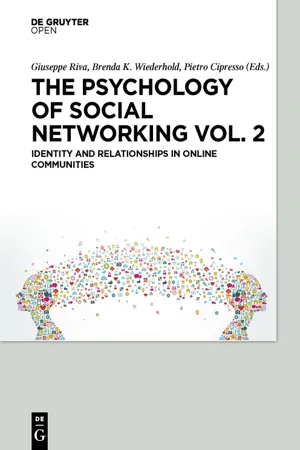
The Psychology of Social Networking Vol.2
Identity and Relationships in Online Communities
- 246 pages
- English
- PDF
- Available on iOS & Android
The Psychology of Social Networking Vol.2
Identity and Relationships in Online Communities
About this book
Using a novel approach to consider the available literature and research, this book focuses on the psychology of social media based on the assumption that the experience of being in a social media has an impact on both our identity and social relationships. In order to 'be online', an individual has to create an online presence – they have to share information about themselves online. This online self is presented in different ways, with diverse goals and aims in order to engage in different social media activities and to achieve desired outcomes. Whilst this may not be a real physical presence, that physicality is becoming increasingly replicated through photos, video, and ever-evolving ways of defining and describing the self online. Moreover, individuals are using both PC-based and mobile-based social media as well as increasingly making use of photo and video editing tools to carefully craft and manipulate their online self. This book therefore explores current debates in Cyberpsychology, drawing on the most up-to-date theories and research to explore four main aspects of the social media experience (communication, identity, presence and relationships). In doing so, it considers the interplay of different areas of psychological research with current technological and security insight into how individuals create, manipulate and maintain their online identity and relationships. The social media are therefore at the core of every chapter, with the common thread throughout being the very unique approach to considering diverse and varied online behaviours that may not have been thus far considered from this perspective. It covers a broad range of both positive and negative behaviours that have now become integrated into the daily lives of many westernised country's Internet users, giving it an appeal to both scholarly and industry readers alike.
Frequently asked questions
- Essential is ideal for learners and professionals who enjoy exploring a wide range of subjects. Access the Essential Library with 800,000+ trusted titles and best-sellers across business, personal growth, and the humanities. Includes unlimited reading time and Standard Read Aloud voice.
- Complete: Perfect for advanced learners and researchers needing full, unrestricted access. Unlock 1.4M+ books across hundreds of subjects, including academic and specialized titles. The Complete Plan also includes advanced features like Premium Read Aloud and Research Assistant.
Please note we cannot support devices running on iOS 13 and Android 7 or earlier. Learn more about using the app.
Information
Table of contents
- Introduction
- 1 A Collective Picture of What MakesPeople Happy: Words Representing SocialRelationships, not Money, are Recurrent withthe Word ‘Happiness’ in Online Newspapers
- 2 The Online Calming Effect: Does the InternetProvide a More Comfortable Modality forConducting Psychotherapy?
- 3 Feeling Anxious without It: Characteristicsof People Prone to Facebook Addiction
- 4 What Determinants Matter When UsersEngage in Particular Collaborative StorytellingWebsites? Exploring Attractive GamificationFeatures and Design Guidelines
- 5 Assessment Of Risk Behaviors RelatedTo Substance Use, Bullying and Alterationsin Body Image in Adolescents Through a 3DSimulation Program
- 6 Play With My Team— Modeling OnlineGame Players’ Teamwork Model in MassivelyMultiplier Online Role Playing Games(MMORPGs)
- 7 Virtual Environments With Chroma-KeyingVideo Capture In Psychological Therapy
- 8 Sharing personal experiences and offeringadvice within online health-based socialnetworks
- 9 The Digital Rage: How Anger is ExpressedOnline
- 10 College Students’ Use of CommunicationTechnology with Parents: Influences ofDistance, Gender, and Social Presence
- 11 Internet addiction: an cross-culturalperspective
- 12 My pixels or my friends? Game charactersas a lens for understanding user avatars insocial networks
- 13 Problem Mobile Phone Use in Spanish andBritish Adolescents: First steps towards across-cultural research in Europe
- 14 Generalized Problematic Internet Use Scale2: update on the psychometric propertiesamong Italian young adults.
- 15 Smartphone for social networking:methodological aspects